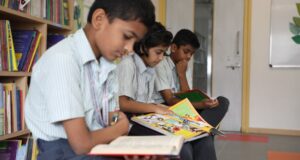Education is highly esteemed in Pune, and parents and teachers strive to give the best learning climate to the younger generation. However, one crucial perspective that is frequently neglected is developing a lifelong habit of reading. This goes beyond what is taught in textbooks and educational plans. It offers access to a universe of information and creativity.
This blog will look into innovative techniques and ways of promoting reading habits among students. Discover how school is highly influencing the future of its students by nurturing a lifetime love of books through well-managed libraries and engaging reading programs.
What are Reading Habits?
Engaging with written material on a regular and intentional basis is what defines reading habits. It could be books, newspapers, magazines, or digital content. These habits are about the act of reading itself as well as encompass a more extensive perspective that includes educating a genuine and getting affection for it.
The regular and routine consumption of written material with an emphasis on intellectual growth and individual betterment defines reading habits.
Ways to Promote Reading Habits Among Secondary School Students
We’re going to look at nine practical strategies for inspiring a love of reading in young individuals.
1. Create a Reading-Friendly Environment
Set up a comfortable and welcoming reading space in the Secondary school library or classroom. Comfortable seats and different books can have a tremendous effect. Guarantee that students have simple access to a wide variety of reading materials.
2. Various Book Choice
Offer a diverse collection of books that cater to various interests and reading levels. Include fiction, non-fiction, graphic books, and magazines. This variety will take care of the unique preferences of every student in the Best secondary school.
3. Reading Challenges
Organize reading challenges or competitions. Make reading goals and reward students for meeting them. Recognizing their accomplishments will rouse them to read more.
4. Book Clubs
Establish book clubs where students can discuss books they’ve read. This creates a sense of community and permits students to share their thoughts and experiences. This fosters a more profound connection with reading.
5. Author Visits and Book Fairs
Invite authors to talk at the school or organize book fairs. These occasions can start students’ interest and excitement about books. Meeting an author in person can be a memorable encounter.
6. Incorporate Technology
Use advanced assets like ebooks and audiobooks. Numerous students are tech-savvy, and digital choices can make reading more available and engaging.
7. Set a Reading Time
Designate a particular time during the school day for silent reading. This training helps establish a routine and urges students to make reading a daily habit.
8. Encourage Parental Involvement
Include guardians by sharing reading recommendations and hosting family reading occasions. When guardians support their kids’ Reading habits in secondary school, students are bound to embrace them.
9. Celebrate Reading Achievements
Celebrate reading achievements and accomplishments. Whether it’s a student completing their first chapter book or reading a specific number of pages, recognize their achievements to support their confidence and motivation.
Why is it Important To Promote Reading Habits In Students?
Let’s examine the five Importance of reading habits and why encouraging a reading culture in school is not only crucial but absolutely necessary.
1. Knowledge Improvement
● Reading habits in students open ways to a treasure lode of information. Whether it’s books or online articles, reading exposes students to a great many subjects and thoughts.
● In regular reading, students gain access to data that goes beyond their textbooks. It expands their perspectives and supports their interest.
2. Language Proficiency
● Reading is a natural method for improving language abilities. It upgrades vocabulary, knowledge, understanding, and grammar.
● A solid command of language is a priceless asset, both academically and in real-world scenarios. It assists students with succeeding in different subjects and communicating effectively.
3. Critical Thinking
● Reading isn’t just about absorbing facts; it encourages critical thinking. When students read, they draw in with the material, analyze it, and structure their own viewpoints.
● This critical thinking expertise is fundamental for problem-solving and decision-making. It also helps in navigating the complexities of the modern world.
4. Empathy and Perspective
● Reading fiction and literature can Improve reading habits and ship students to various universes and points of view. It permits them to empathize with characters and grasp diverse cultures and viewpoints.
● Empathy is a vital life ability, promoting tolerance, compassion, and the ability to collaborate with others.
5. Academic Excellence
● Students who read routinely tend to perform better academically. Reading assists them with grasping complex ideas and succeeding in tests. It also assists with composing essays and reports.
● A solid academic foundation can open ways to better educational opportunities and future career success.
How do Reading Habits Improve Students’ Learning?
We’ll look at the various ways that encouraging reading habits may significantly improve kids’ overall educational experiences.
1. Vocabulary Expansion
Reading exposes students to a wide variety of words and phrases. As they experience new words in context, their vocabulary naturally extends. This improves their reading command as well as improves their writing and relational communication. This is priceless in academics and beyond.
2. Improved Writing Skills
Those who read extensively tend to be better writers. They naturally get sentence construction, grammar, and writing styles from the authors they respect, which is reflected in their own writing assignments.
3. Better Concentration and Focus
In this digital age, distractions are all over. However, reading demands a level of concentration and focus that can assist students with improving their attention span. This ability isn’t just crucial for studying and productivity in general.
4. Stress Reduction
Reading can be a soothing activity that helps reduce stress levels. Escaping into a good book can give a mental break from the pressures of academic life, promoting unwinding and overall well-being.
5. Lifelong Learning
The most significant benefit of cultivating Reading habits among students is the promotion of lifelong learning. Students who develop a love for reading are more likely to continue seeking knowledge even after their formal education ends. This thirst for learning can lead to personal and professional growth throughout their lives.
Also Read: Best International Schools in Pune
Conclusion
It is essential for kids’ growth to encourage reading habits in the best secondary school. To encourage reading, it is essential to present information in a clear and concise manner. This means organizing the text logically, with the most important information first.
Sentences should be kept short and include only necessary information. Using everyday language and avoiding jargon and legal terminology can make the text more accessible. Additionally, using an active voice can increase clarity.
Frequently Asked Questions
1. What are the reasons for poor reading habits in secondary school students?
There can be various reasons, including a lack of access to books, distractions from digital media, and a curriculum that prioritizes reading.
2. What skills are necessary in reading?
Reading skills encompass vocabulary, comprehension, critical thinking, and the ability to analyze and interpret text.
3. What is the role of the teacher in developing reading skills?
Teachers are essential in encouraging the joy of reading by choosing interesting texts and conducting conversations. They should also provide guidance and encouragement.
4. What are the factors affecting the reading habits of secondary school students?
Factors include family influence, peer pressure, book access, school initiatives, and personal interests. Schools and parents can work together to address these factors positively.































